Incorporating Workforce Skills in GED & ELA Classes

“Using the ReMix Challenge as a PLC allowed new and veteran teachers to interact as well as present in a virtual format to their peers.”
Team S.P.A.C.E. Matters
by Dr. Barbara Brown
| Team Members | Project Summary: |
|---|---|
|
Three groups comprised of new & veteran instructors from Southside Programs for Adult Continuing Education were formed to develop lesson plans based on College & Career Readiness Standards related to workforce skills. The lessons developed focused on three topics: Digital Literacy, Financial Literacy, and Job Skills. Led by an instructional coach, each group created their lesson plans and presented to each other in order to evaluate their lessons using a rubric. |
The AE&L Conference ReMix Challenge provided a great opportunity for Southside Programs for Adult Continuing Education (S.P.A.C.E.) to focus on integrating workforce skills into GED® and English language arts (ELA) classrooms. The AE&L Conference ReMix Meet the Challenge provided the opportunity for our instructors to create lesson plans using the workforce skills identified by the Virginia Department of Education (VDOE). Our instructors are tasked with providing instruction for learners that want to earn their GED® certificate, as well as providing instruction on workforce skills.
It was determined that a professional learning community (PLC) would be the ideal format for the instructors to create lesson plans on some of the workforce skills and share the results with their peers. The ReMix Challenge concept presented several challenges. These challenges included identifying teams for the PLC, determining whether to meet virtually or in-person, and figuring out how the teams would present their lesson plans. The name selected for the team was S.P.A.C.E. Matters. The acronym S.P.A.C.E. represents the name of our regional program and what we do with our learners matters.
After viewing the 21st Century Workplace Readiness Skills for the Commonwealth developed by VDOE, it was determined that the three teams would consist of 2-3 instructors and an instructional coach. The instructional coaches were Cheryl Perkins, PIVA Coordinator, and three veteran instructors—Dr. Marion Wilkins, Leo Akujuobi, and Bettie Nickerson. The instructional coaches also served as members of the Planning Team for the project. The Planning Team began meeting in October to collaborate on the areas of focus, presentation format, and how often the teams would meet. It was determined that the areas of focus would be Digital Literacy, Financial Literacy, and Pre-Employment/Employment Skills and all would include Reading, Writing, and Mathematics. The lesson plans had to include the content area, College and Career Readiness (CCR) Standards, central skills of focus, technology/websites, vocabulary, materials, accommodations (if needed), instructional objectives, guided practice, and an assessment.
Each team was expected to present their results in a 50-minute virtual presentation during the month of March. The presentation had to demonstrate the incorporation of digital literacy and blended learning into a learner-center practice or work setting. The instructional teams consisted of new and veteran instructors. Team One members were Dr. Adrainne Thomas and Patricia Jiles. Team Two members included Autumn Bedwell, Francis Ferebee, and Missy Gates. Team Three members were Pinkie Hall and Tonya Humphrey.
The team leader met via Zoom with the teams and the program manager, Kathy Anderson, in November. Each team member was given a book on the workforce skill selected for the group and a notebook that included the following: an introduction to the project, names and contact information for each team, the 21st Century Workplace Readiness Skills for the Commonwealth, articles on workforce skills from The Skills That Matter in Adult Education, copies of the CCR Standards in Literacy/Language Arts, Mathematics, and English Language Acquisition, sample lesson plans from The Skills that Matter in Adult Education, a lesson plan rubric, and resources. Teaching the Skills that Matter from LINCS was used as a guide for writing the lesson plan.
Team One
Team One presented a PowerPoint and lesson plan on “Finding a Job Online.” Their lesson plan included the steps students needed to follow to apply for a job online and an online assessment to determine if the student followed the steps correctly. The team utilized Jobs.Virginia.Gov as a major component of their lesson plan. The lesson also included a Career Cluster Survey and focused on the following skills: critical thinking, problem-solving, reading, writing, making inferences, summarizing, and identifying the main idea and supporting details.
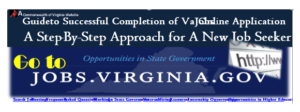
Team Two
Team Two presented a lesson plan on Financial Literacy— “Completing a W2 Form.” As an introduction, the team used a Kahoot activity on tax trivia. They also used a YouTube video to assist students. The students would be required to complete a W2 form. An online assessment was incorporated so that the instructor could determine if the students had mastered the skill of completing the W2 form.
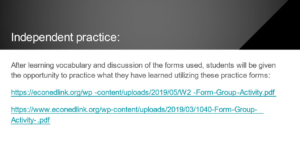
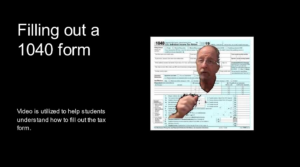
Team Three
Team Three developed a lesson plan on “Analyzing Job Postings Online”. As an introduction, this team used a Venn diagram to get the students thinking about how they found jobs in the past and in the present.
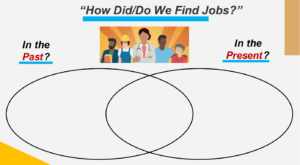
The teams also incorporated a Kahoot and Mentimeter activities in their presentations.
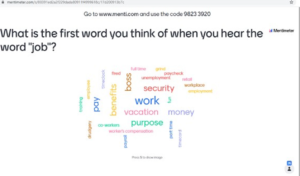
Team Three stressed the importance of incorporating online programs such as Essential Education’s Work Essentials. This program provides a wealth of lessons on finding jobs online, guided practice exercises, and assessments. It includes links to resources, the Occupational Outlook Handbook, a transcript of the lessons, and job sites.
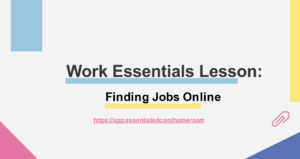
During the virtual meetings, the teams that were not presenting used the lesson plan rubric to comment on the team presenting. The feedback was very helpful in assisting the teams if corrections or additional information was needed in the lesson plan. The teams gained valuable experience presenting virtually to their peers. One team was selected to present their lesson plan during the ReMix Challenge Showcase.
The teams learned to overcome several challenges. Since most of the instructors met virtually with their students, it was difficult scheduling times to meet on the project. The team members were also tasked with finding resources to incorporate into their plans. The plans also had to adhere to the lesson plan rubric. Each team had to submit their plan to the Team Leader five days prior to their presentation for review. After reviewing the lesson plan and making revisions if needed, the plan was emailed to the other teams prior to the team’s presentation.
There are lessons to be learned from this project. As adult educators, we can adapt to almost any situation. Meeting virtually proved a challenge, but the teams were able to overcome this challenge. Using the ReMix Challenge as a PLC allowed new and veteran teachers to interact as well as present in a virtual format to their peers. The teams also had to use a blended learning approach to the project. Too often when incorporating workforce skills in the classroom our ELA students are omitted. One team had an ELA instructor as a member. The teams also presented their projects during our in-person staff meeting in May. One team gained valuable experience when they presented at the state conference in April.
Since we were only able to target three of the workforce skills, a PLC will be utilized in the fall utilizing three different workforce skills. The teams will be comprised of an instructional coach and 2-3 team members made up of new, veteran, and ELA instructors. They will have the option of meeting virtually and/or in person. In addition to presenting their plans to their peers, they will also present their lesson plans during our winter staff meeting.
To learn more about the work accomplished by the S.P.A.C.E Matters team, take a look at their showcase presentation and supportive resources.
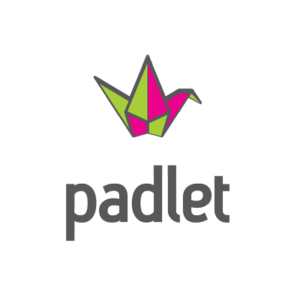 We are including some of the comments received for each showcase team. View more of the showcase discussion in the 2020 AE&L Conference ReMix TeamShowcase Padlet.
We are including some of the comments received for each showcase team. View more of the showcase discussion in the 2020 AE&L Conference ReMix TeamShowcase Padlet.
“We also use Essential Ed, and I have used computer essentials, but was not tuned into Workplace or Financial Essentials. You’ve inspired me to take a look at them!”
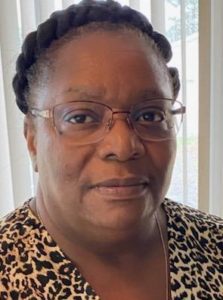 Barbara H. Brown, Ed.D., is the Regional Specialist for Southside Programs for Adult Continuing Education (Region 19). Dr. Brown is a retired educator with over 40 years in public education. She has worked as a special education teacher, Gifted Coordinator, 504 Coordinator, Educational Diagnostician, and adult education instructor. She has over 30 years’ experience in adult education.
Barbara H. Brown, Ed.D., is the Regional Specialist for Southside Programs for Adult Continuing Education (Region 19). Dr. Brown is a retired educator with over 40 years in public education. She has worked as a special education teacher, Gifted Coordinator, 504 Coordinator, Educational Diagnostician, and adult education instructor. She has over 30 years’ experience in adult education.